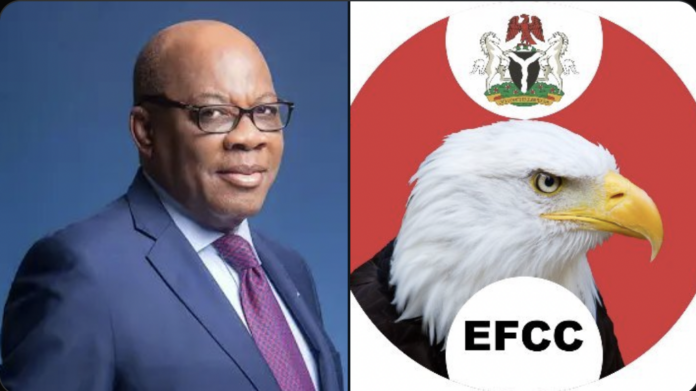Renowned human rights activist and former Nigerian Bar Association (NBA) President, Olisa Agbakoba, SAN, has made bold and controversial remarks about the Economic and Financial Crimes Commission (EFCC). He has labeled the anti-corruption agency as a “terrorist organisation,” accusing it of using its powers to intimidate and terrorize ordinary Nigerians.
Agbakoba made these comments during an appearance on Arise TV’s Morning Show, where he discussed the growing concern over how the EFCC operates. According to Agbakoba, the commission has gone beyond its mandate and is now misusing its authority to strike fear into the hearts of Nigerians.
“They are terrorists,” Agbakoba stated bluntly during the interview. “They are terrorising us… intimidating Nigerians with their powers.” He criticized the EFCC for bullying citizens, adding that the agency’s actions were not in line with what a proper law enforcement organization should do.
Agbakoba’s harsh words come at a time when there is increasing scrutiny on Nigeria’s anti-corruption agencies, including the EFCC. He highlighted that while the agency has accomplished some good things, it has also overstepped its boundaries in many instances. He pointed out that the EFCC is often feared not because it upholds the law, but because it wields unchecked power.
In the same interview, Agbakoba questioned the constitutional legitimacy of the EFCC. He expressed doubts about the agency’s legal foundation, arguing that the manner in which the EFCC was established by the Federal Government may not entirely align with the Nigerian Constitution.
The former NBA President’s remarks reflect broader concerns that the EFCC may be acting outside the limits of its mandate. He emphasized the need for reforms and urged the National Assembly to take a closer look at the laws governing the EFCC’s operations.
“In order to resolve the issue surrounding the legitimacy of the EFCC, it’s for the House of Assembly to clarify what the EFCC should be doing,” Agbakoba said. He questioned why Nigeria has multiple anti-corruption agencies such as the Special Fraud Unit (SFU) and the Independent Corrupt Practices Commission (ICPC) that seem to be doing similar work, yet achieving limited results.
Agbakoba’s comments echo the frustration of many Nigerians who feel that the EFCC, which was originally set up to combat corruption, has veered off course. In recent years, the agency has been criticized for its aggressive methods, including arresting and publicly humiliating high-profile individuals before their guilt has been established in court.
“The EFCC has done some good things,” Agbakoba acknowledged, “but it has also done a lot of bad things.” He cited examples such as the case of a former Nigerian Inspector General of Police who was dragged publicly during an investigation. Agbakoba questioned whether such actions were appropriate, arguing that in a more orderly society, law enforcement agencies should handle such matters with more dignity and respect for the law.
Agbakoba believes that the EFCC’s approach undermines the very principles of justice and fairness that it was created to uphold. He noted that citizens should not fear their own law enforcement agencies, and that the EFCC’s tactics are causing widespread anxiety.
“When you hear EFCC, you become scared,” Agbakoba said. “That’s not what a law enforcement agency should be; they ought to be better.”
The role of the EFCC has been the subject of intense public debate in Nigeria. Established in 2003 to investigate financial crimes, the EFCC was seen as a necessary step in the fight against corruption. However, over the years, its methods and effectiveness have come under scrutiny.
Many Nigerians initially supported the EFCC, hoping it would serve as a watchdog against the looting of public funds. However, there has been growing concern about its operations, with critics like Agbakoba questioning whether the commission has strayed from its purpose.
Agbakoba’s criticism of the EFCC is part of a larger conversation about the conduct of anti-corruption agencies in Nigeria. While no one denies that corruption is a significant problem in the country, there is a widespread feeling that agencies like the EFCC must be held accountable and should not operate with impunity.
“There is no justification for the deficiencies in the system,” Agbakoba said, referring to the need for checks and balances in the fight against corruption. “The deficiencies in the system are no reason for anyone to get away, because that would defeat the whole purpose.”
The EFCC’s reputation has taken a hit in recent years, with accusations of abuse of power, corruption within the agency, and the mishandling of high-profile cases. Agbakoba’s comments have only added fuel to the fire, as they come from a respected figure in the legal profession.
Agbakoba is not the only one calling for a review of the EFCC’s operations. Civil society groups, legal experts, and even some politicians have raised concerns about the commission’s tactics. They argue that while the EFCC was established with good intentions, it now appears to be a tool for political persecution and a means of silencing dissent.
Critics have also pointed to cases where the EFCC has been accused of selectively targeting opposition politicians while ignoring allegations of corruption within the ruling party. This has led to accusations of bias and political manipulation, further damaging the EFCC’s credibility. “The EFCC has to change its approach,” Agbakoba said. “We need anti-corruption agencies that the people trust, not

